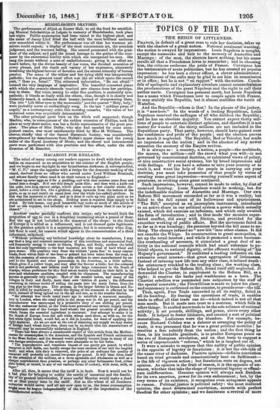MENDELSSOHN'S ORATORIO.
The performance of Elijah at Exeter Hall, to aid the fund for establish- ing Musical Scholarships at Leipsic in memory of Mendelssohn, took place last night. Public expectation had been raised to the highest pitch, and the name of Jenny Liud filled the hall with the most brilliant audience ever assembled within it. Her performance was all that her warmest ad- mirers could expect; a display of the most consummate art, the soundest judgment, and the warmest feeling. She seemed penetrated with the gran- deur of the subject, and paid the truest homage to the genius of the com- poser by the reverential fidelity with which she interpreted his text. She sang the music without a note of embellishment; giving it an effect un- heard before, by the divine beauty of her voice, the finished execution of every phrase, and the depth and variety of her expression, alternately breathing the highest fervour of devotion and the utmost intensity of human passion. The scene of the widow and her dying child was inexpressibly pathetic; but the greatest vocal effort was the air which opens the second part, " Hear ye, Israel." The reiterated exhortation, " Be not afraid!" seemed the very language of inspiration. The beautiful concerted pieces with which the oratorio abounds received new charms from her participa- tion in them. Her voice, among its other fine qualities, is eminently sym- pathetic; it blends so finely with the others, that, though it is clearly and distinctly heard, it enhances their beauty, instead of overpowering them. The trio " Lift thine eyes to the mountains," and the quartet " Holy, holy," were probably never so enchantingly sung. In the last " sublime pasan of angels," as a contemporary critic this morning remarks, "the value of her sustained notes was exquisitely demonstrated."
The other principal parts were on the whole well supported; though Machin, who, in consequence of the sadden secession of Phillips, took his place at very short notice, was but a feeble representative of the great pro- phet. The place of Miss Dolby, who also had seceded for some unex- plained reason, was most satisfactorily filled by Miss M. Williams. The chorus, chiefly that of the Sacred Harmonic Society, was considerably strengthened by detachments from Hullah's upper classes and the young ladies of the Royal Academy of Music; and the choral and instrumental parts were performed with nice precision and fine effect, under the able direction of M. Benedict.


























 Previous page
Previous page